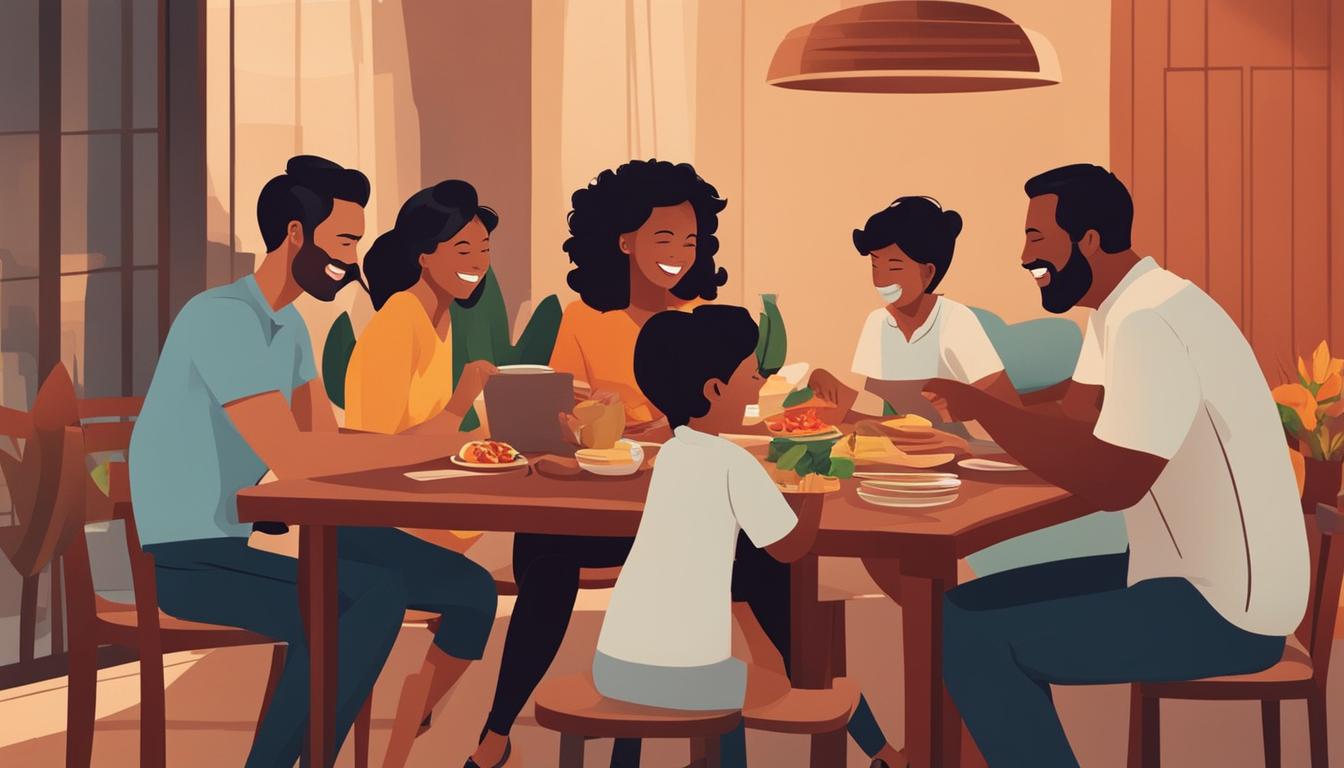Family dynamics play a crucial role in shaping our personal relationships. The way we interact with our family members, the roles we assume, and the communication patterns we engage in can significantly impact our mental health and influence our behaviors, well-being, and work relationships. Understanding the importance of family dynamics is essential for personal growth and improving our interpersonal connections.
Key Takeaways:
- Family dynamics refer to the patterns of interactions between family members, including roles, hierarchies, and communication.
- Understanding and analyzing our family dynamics can help us gain more control over how they shape our perceptions and actions.
- There are different types of family dynamics, including healthy and dysfunctional ones.
- Family dynamics can have a significant impact on our self-awareness and personal growth.
- Creating healthy family dynamics involves open communication, emotional support, shared responsibility, and mutual respect.
Understanding Family Dynamics: The Key to Stronger Relationships
Family dynamics play a crucial role in shaping who we are and how we interact with others. By understanding these dynamics, we can gain valuable insights into our own behaviors and improve our communication within the family unit. Family dynamics encompass various aspects, including roles, hierarchies, and communication patterns, which greatly influence our perceptions and actions.

Family communication is a fundamental component of family dynamics. It determines how information is shared, conflicts are resolved, and relationships are nurtured. Open and effective communication fosters healthy family dynamics, allowing family members to express their thoughts, feelings, and needs. It also builds trust and strengthens the bonds between family members.
In addition to communication, family roles and hierarchies are another essential aspect of family dynamics. Each family member has a unique role within the family system, such as parent, child, or sibling. These roles often come with certain expectations and responsibilities. Understanding and acknowledging these roles can provide clarity and help establish healthy boundaries within the family.
Key Takeaways:
- Family dynamics refer to patterns of interactions between family members, including roles, hierarchies, and communication.
- Understanding family dynamics is crucial in improving interpersonal connections and personal growth.
- Effective communication and clear family roles are vital for maintaining healthy family dynamics.
Types of Family Dynamics
Family dynamics can vary greatly from one household to another. Understanding the different types of family dynamics is essential in recognizing what constitutes a healthy or dysfunctional family dynamic. Here are some of the main types:
- Authoritarian: In this type of family dynamic, there is a strong emphasis on control and strict adherence to rules and expectations. Communication is often one-way, with little room for individual expression or opinion.
- Authoritative: This type of family dynamic promotes open communication and encourages the development of independent thinking and decision-making skills. Parents maintain authority while also valuing their children’s perspectives.
- Competitive: In a competitive family dynamic, family members often engage in constant competition, comparing achievements and seeking validation through accomplishments. This dynamic can create tension and a lack of support.
- Uninvolved: In an uninvolved family dynamic, there is a lack of emotional support and engagement. Parents may be neglectful or indifferent to their children’s needs, leading to feelings of abandonment.
- Communal: A communal family dynamic emphasizes shared responsibilities, open communication, and emotional support. Family members work together as a team and make decisions collectively.
- Alliance-based: In this type of family dynamic, family members form alliances within the family unit, often against others. This dynamic can lead to exclusion, favoritism, and a lack of unity.
Healthy family dynamics are characterized by open communication, emotional support, shared responsibility, and mutual respect. These dynamics contribute to positive relationships and overall well-being. On the other hand, dysfunctional family dynamics, such as control, rigidity, competition, neglect, or forming alliances within the family, can have detrimental effects on individuals and their relationships.
“A healthy family dynamic is like a well-oiled machine, with each member playing their part and supporting one another.”
Recognizing and understanding the different types of family dynamics is an important step in creating positive change within our own families. By striving for healthy family dynamics, we can foster stronger relationships, promote personal growth, and enhance overall well-being for ourselves and our loved ones.
Impact of Family Dynamics on Self-Awareness
Our family dynamics play a crucial role in shaping our self-awareness. The interactions, roles, and communication patterns within our family unit can deeply influence how we perceive ourselves and others. By understanding how our family dynamics have influenced us, we can gain valuable insights into our behavior and make conscious choices to promote personal growth and improve our relationships.
Family dynamics can evoke various emotions and beliefs that shape our self-awareness. For example, growing up in a family with strict rules and hierarchies may lead us to develop a strong sense of authority or a need to conform. On the other hand, being part of a supportive and nurturing family can foster a sense of security and empathy.
Recognizing and reflecting on our family roles and dynamics can help us identify patterns that may be hindering our personal growth. It allows us to question outdated belief systems and behaviors that no longer serve us. By gaining a deeper understanding of our family dynamics, we can develop the self-awareness needed to make positive changes and create healthier relationships.
The Role of Communication in Family Dynamics
Effective communication is a key aspect of family dynamics and self-awareness. Open and honest communication promotes understanding, trust, and emotional connection within the family unit. It allows family members to express their thoughts, feelings, and needs, fostering a healthy exchange of ideas and perspectives.
Poor communication, such as frequent arguments, lack of active listening, or avoidance of difficult conversations, can lead to misunderstandings and resentment. These communication patterns can contribute to negative self-perceptions and hinder self-awareness. By improving communication within our family, we can create a safe and supportive environment that encourages self-expression and personal growth.
Family dynamics shape our self-awareness by influencing our beliefs, values, and behaviors. By understanding and reflecting on our family dynamics, we gain valuable insights into ourselves and can make conscious choices to foster personal growth and improve our relationships.
Self-awareness is a lifelong journey, and our family dynamics provide a foundation for this exploration. By acknowledging the impact of our family dynamics on our self-awareness, we empower ourselves to break free from limiting patterns and foster healthier relationships with ourselves and others.

Examples of Healthy Family Dynamics
Healthy family dynamics are essential for fostering strong relationships and creating a supportive environment. Here are some examples of healthy family dynamics:
- Open communication: In healthy families, there is open and honest communication between all members. Each person feels comfortable expressing their thoughts, feelings, and needs without fear of judgment or criticism.
- Emotional support: Healthy families provide emotional support to one another. They offer a listening ear, empathy, and understanding during challenging times. This support helps each family member feel validated and secure.
- Shared responsibility and authority: In healthy families, responsibilities and decision-making are shared among all members. Each person contributes to the functioning of the family unit, and everyone’s opinions and ideas are valued.
- Mutual respect: Respect is at the core of healthy family dynamics. Family members treat each other with kindness, consideration, and respect for individual boundaries and differences. They value each other’s opinions and show appreciation for one another.
Healthy family dynamics involve families that encourage individual expression, provide emotional support during challenging times, and involve all family members in decision-making and problem-solving.
These examples of healthy family dynamics create a nurturing environment where individuals can thrive, build strong connections, and develop essential relationship skills. They contribute to the overall well-being and happiness of the family as a whole.
Summary
Healthy family dynamics involve open communication, emotional support, shared responsibility and authority, and mutual respect. Examples of healthy family dynamics include families that encourage individual expression, provide emotional support during challenging times, and involve all family members in decision-making and problem-solving. These dynamics create a nurturing environment where individuals can thrive and build strong connections.
Recognizing and Addressing Toxic Family Dynamics
Addressing toxic family dynamics is crucial for creating a healthier and more harmonious family environment. Toxic dynamics can include patterns of control, manipulation, emotional abuse, and neglect that can negatively impact our well-being and relationships. Recognizing these dynamics is the first step towards change and improvement.
Setting boundaries is an important part of addressing toxic family dynamics. Establishing clear limits on what behavior is acceptable and asserting our own needs and boundaries can help create a healthier dynamic. This may involve communicating our boundaries assertively and consistently, and being prepared to enforce consequences if they are violated.
Seeking therapy or counseling can also be beneficial in addressing toxic family dynamics. A professional can provide guidance, support, and tools for navigating difficult family dynamics. They can help individuals gain insight into their own roles and behaviors within the dynamic, and develop strategies for improving communication, resolving conflicts, and fostering healthier relationships.

Additionally, working on personal growth and communication skills is essential for addressing toxic family dynamics. This can involve developing self-awareness, practicing effective communication techniques, and learning how to manage emotions and conflicts constructively. By focusing on our own growth and behavior, we can begin to shift the dynamic within our family and create positive change.
The Influence of Family Dynamics on Health
Family dynamics play a significant role in shaping our overall health and well-being. Unhealthy family dynamics, characterized by constant arguments, criticism, or neglect, can have a detrimental impact on our physical and mental health. The stress and emotional distress caused by these dynamics can contribute to various health issues, including cardiovascular problems, depression, and anxiety.
On the other hand, healthy family dynamics characterized by support, open communication, and mutual respect can promote better health outcomes. When family members feel heard, understood, and valued, they experience lower levels of stress and emotional distress, leading to improved mental health. Additionally, strong social support within a healthy family dynamic can provide a protective factor against mental health conditions and enhance overall resilience.
It’s important to recognize the impact of family dynamics on our health and take steps to improve them. By fostering healthier communication patterns, resolving conflicts in a constructive manner, and seeking professional help if needed, we can create a more supportive and nurturing family environment. Prioritizing our well-being and that of our loved ones through positive family dynamics can lead to happier, healthier lives for all.

The Impact of Healthy Family Dynamics:
- Promotes better mental health and emotional well-being
- Reduces stress and emotional distress
- Enhances resilience and coping skills
- Improves overall physical health outcomes
- Provides a supportive environment for personal growth and self-awareness
The Impact of Unhealthy Family Dynamics:
- Increases the risk of mental health issues
- Contributes to higher levels of stress and emotional distress
- Can lead to physical health problems such as cardiovascular issues
- Negatively affects self-esteem and self-worth
- Impairs relationships and social functioning
The Role of Family Dynamics in Society
Family dynamics play a crucial role in shaping individuals and society as a whole. Within the context of family relationships, such as parent-child or sibling dynamics, we develop values, beliefs, and behaviors that influence our interactions with others. These dynamics not only impact our personal relationships but also extend beyond the boundaries of our immediate family.
In healthy family dynamics, individuals learn important social skills, empathy, and the value of interpersonal connections. When families foster open communication, emotional support, and mutual respect, they contribute to the development of strong communities. Healthy family relationships serve as a foundation for positive interactions and support networks, which are essential in maintaining the well-being of individuals and society.
Building Healthy Family Dynamics
Building healthy family dynamics begins with recognizing the importance of positive relationships within our families. Here are some key aspects that contribute to healthy family dynamics:
- Open communication: Encouraging honest and effective communication allows family members to express their thoughts and feelings freely, leading to better understanding and resolution of conflicts.
- Emotional support: Creating a safe and supportive environment fosters emotional well-being for all family members, ensuring that everyone feels heard, validated, and cared for.
- Mutual respect: Respecting each individual’s boundaries, opinions, and needs helps to build trust and strengthen family relationships.
“In healthy family dynamics, individuals learn important social skills, empathy, and the value of interpersonal connections.”
By actively working towards developing these aspects within our families, we contribute to the well-being of society as a whole. Strong family dynamics lay the foundation for healthy communities, promoting positive interactions, and fostering a sense of belonging.
Changing Family Dynamics in Modern Society
In today’s modern society, family dynamics have undergone significant changes, reflecting the diversity and fluidity of our evolving communities. Traditional notions of family structures are being redefined, giving rise to a range of nontraditional family configurations. Single-parent households, blended families, and chosen families are becoming more prevalent, highlighting the importance of recognizing and accepting diverse family dynamics.
These changing family dynamics have paved the way for an inclusive and accepting society, where love, support, and connection can transcend traditional boundaries. Families are now more diverse in race, ethnicity, gender, and sexual orientation, reflecting the rich tapestry of our global community. This shift challenges societal norms and encourages individuals to embrace a broader definition of family, one that extends beyond blood ties.
The acceptance of these evolving family dynamics has also led to an increased understanding of the unique challenges and joys they bring. Families are finding new ways to navigate relationships, communicate effectively, and support one another. This has created opportunities for personal growth, empathy, and mutual respect, fostering a stronger sense of community and interconnectedness.

Embracing the Fluidity of Family Dynamics
With changing family dynamics, it is crucial to embrace the fluidity and diversity that exists within our communities. By challenging traditional beliefs and stereotypes, we can foster a more inclusive and compassionate society that values all types of families. It is important to recognize that family is not solely defined by blood relations but by the love, support, and connection shared between individuals.
As these changes continue to shape our society, it is essential to provide resources and support for families navigating nontraditional dynamics. This includes access to counseling, legal assistance, and community programs that cater to the unique needs of diverse families. By offering these resources, we can help individuals and families thrive amidst the changing landscape of family dynamics.
“Family is not an important thing, it’s everything.” – Michael J. Fox
As we move forward, let us celebrate and embrace the myriad of family dynamics that exist in our modern society. By fostering understanding, acceptance, and support, we can create an environment where all families feel valued and empowered.
Professional Support for Understanding and Changing Family Dynamics
Improving family dynamics can be a complex process that may require professional support. Family therapy or counseling can provide valuable insights and strategies to help individuals understand and change their family dynamics.
Working with a trained professional allows individuals to gain a deeper understanding of how their family dynamics have influenced their thoughts, feelings, and behaviors. Through therapy or counseling, individuals can explore their family history, uncover patterns, and identify areas for improvement.
Professional support offers a safe and non-judgmental space to discuss family dynamics, address conflicts, and develop effective communication skills. Therapists or counselors can guide individuals in developing strategies to improve relationships, set healthier boundaries, and cultivate open and supportive family dynamics.
Remember, improving family dynamics is a journey that requires time, effort, and commitment. Seeking professional support can provide the necessary guidance and tools to navigate this process, ultimately leading to healthier and more fulfilling relationships within your family.
Conclusion
Family dynamics play a vital role in shaping our personal relationships and overall well-being. Understanding and recognizing our family dynamics is the first step towards improving our relationships and creating healthier dynamics.
By fostering healthy family dynamics, we can strengthen our connections with loved ones and promote personal growth. Open communication, emotional support, and mutual respect are key elements of healthy family dynamics that contribute to stronger relationships.
Improving relationships within our families requires effort and a willingness to address any toxic dynamics that may exist. It may be beneficial to seek professional support, such as family therapy or counseling, to gain insights and develop strategies for positive change.
Remember, while we cannot change the past, we have the power to alter our own roles and behaviors in the present. By embracing healthy family dynamics, we can create a foundation for happiness, personal growth, and the well-being of ourselves and our loved ones.
FAQ
What are family dynamics?
Family dynamics refer to the patterns of interactions between family members, including roles, hierarchies, and communication.
Why are family dynamics important?
Family dynamics significantly impact our mental health and influence our behaviors, well-being, and work relationships.
What are the different types of family dynamics?
The six main types of family dynamics are authoritarian, authoritative, competitive, uninvolved, communal, and alliance-based.
How can family dynamics influence self-awareness?
Family dynamics shape how we see ourselves, others, and the world around us, impacting our self-awareness.
What are some examples of healthy family dynamics?
Healthy family dynamics involve open communication, emotional support, shared responsibility and authority, and mutual respect.
How can toxic family dynamics be addressed?
Toxic family dynamics can be addressed by setting boundaries, seeking therapy or counseling, and working on personal growth and communication skills.
How do family dynamics impact health?
Unhealthy family dynamics can lead to increased stress and emotional distress, which can contribute to various physical and mental health issues.
What role do family dynamics play in society?
Family dynamics foster positive relationships, empathy, and social skills, contributing to strong communities and shaping interactions with others.
How are family dynamics changing in modern society?
Family dynamics are evolving with variations in household structures and the acknowledgment and acceptance of nontraditional families.
Is professional support available for understanding and changing family dynamics?
Yes, professional support such as family therapy or counseling can help individuals gain insights and develop strategies for improving their family dynamics.


